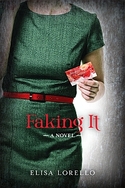
 Ask ten different scholars of rhetoric to define the word, and you’ll get ten different answers. Dictionary definitions usually say something along the lines of “the skill or study of using language as persuasion” (the one I give to my students gets even more specific: The art and skill of using language to communicate and/or persuade”). I suppose the key words in these definitions are “language” and “persuade”. Analyze any piece of writing—be it fiction or non-fiction, a bumper sticker or a political speech, a text message or a tweet, a lab report or a love letter—and you’ll find that each one is designed to move the reader in some way: to thought, to action, to response. The language may make an emotional appeal, a logical appeal, or an ethical appeal. What’s more, each one of these aforementioned texts tends to be in response to something else and is part of an ongoing conversation.
Ask ten different scholars of rhetoric to define the word, and you’ll get ten different answers. Dictionary definitions usually say something along the lines of “the skill or study of using language as persuasion” (the one I give to my students gets even more specific: The art and skill of using language to communicate and/or persuade”). I suppose the key words in these definitions are “language” and “persuade”. Analyze any piece of writing—be it fiction or non-fiction, a bumper sticker or a political speech, a text message or a tweet, a lab report or a love letter—and you’ll find that each one is designed to move the reader in some way: to thought, to action, to response. The language may make an emotional appeal, a logical appeal, or an ethical appeal. What’s more, each one of these aforementioned texts tends to be in response to something else and is part of an ongoing conversation.
Moreover, when we write, be it a novel or a blog post or a marketing analysis or a resume, we write with purpose and an audience in mind—even if we keep a private diary, we write “Dear Diary,” implying an intended reader, even if that reader is the self. (Don’t even get me started on the rhetorical situations of Facebook status updates…)
When I wrote the first draft of my novel FAKING IT, I was fresh out of graduate school and was still in a major love-geekout-fest with rhetorical theory and writing. I’d not written much fiction throughout my lifetime (my last attempts being in high school and being quite terrible—I recall a lot of scenes set at beach parties, for some reason) and wasn’t very confident that this most recent attempt was going to pan out. And yet, there was something different this time—this idea I had, about a thirty-something, sexually inhibited woman who befriends a male escort, was screaming to be born.
I hadn’t set out to make Andi a writing and rhetoric professor. It’s just that she needed to teach Devin something while he was giving her those love lessons. And since I have always recommended my students to write what they know, I thought, Why not have Andi teach Devin about writing? After all, that’s what I know…
It turned out to be what I fondly call “the happy little accident.”
Andi and Devin’s relationship is wonderfully rhetorical. It’s an ongoing dialectic, each one constantly challenging the other to act (or react) through language and dialogue. Their tutorials, discussions, arguments, and intimacies are all persuasive in what they say (and don’t say) to one another. They discover each other (and themselves) through writing, whether it’s Devin’s journal entries or Andi’s reading selections. Even the art exhibits Devin and Andi view are rhetorical in that the characters witness a reflection of themselves and the world around them, and in turn become a part of something else.
What’s more, this rhetorical relationship is precisely what makes Devin and Andi so mutually attractive. It’s their “spark,” if you will. Not the stuff most romances are made of, but as and Devin and Andi’s dialogue poured onto the page, I was pleasantly surprised by how well it worked.
I can’t help but take a rhetorical approach to my writing—it’s sort of in my DNA—but it’ll come as no surprise to you that dialogue is perhaps my favorite part of novel-writing. It’s when the characters reveal themselves, all in what they say and how they say it. The truth comes out, even when they’re lying to each other or themselves.
Relationships are wonderfully rhetorical; all you have to do is sit back and listen to the conversation.
Elisa Lorello
http://elisalorello.com/
To comment on Elisa Lorello’s blog please click here.


No Comments
Comments are closed.